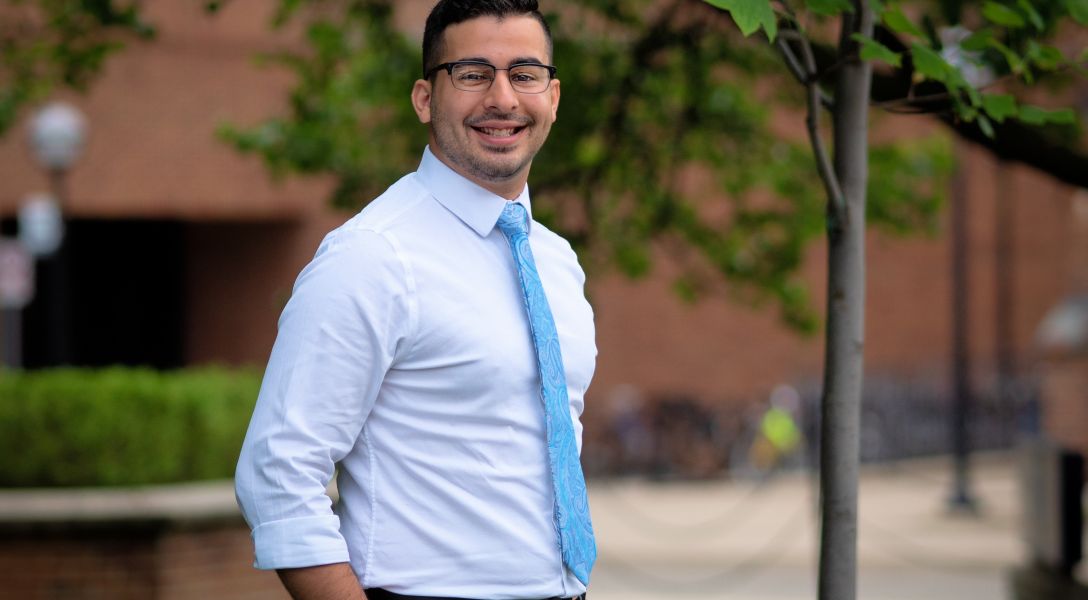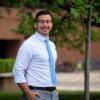Stephen Salerno's enthusiasm for biostatistics is unquestionable, and that passion grew out of his time at Cornell. As an undergraduate in biometry and statistics, Salerno learned how statistics could be applied across different fields and put to use to solve global problems. Today, he's pursuing a PhD in biostatistics.
"Doing research as an undergraduate gave me the opportunity to contribute to applied projects from metabolomics studies to fracking citations, as well as more methodological topics such as the application of convex optimization to problems like Sudoku," Salerno said. "Most importantly, it showed me that I enjoyed research and wanted to be able to make my own contributions to the field."
After wrapping up his undergraduate studies, Salerno earned his master's degree in biostatistics at the University of Michigan and opted to stick around Ann Arbor to pursue a PhD.
You’re currently pursuing your PhD in biostatistics. What year of your studies are you entering (as of this coming Fall)? And what are your research focuses?
It is hard to believe, but I am starting the second year of my PhD at the University of Michigan. I also received my master’s in biostatistics from Michigan. My research is in Bayesian latent variable models, ranking methods, and joint estimation for mixed-type data.
While the specifics of my thesis are still coming into focus, what is important to me is its application. I work in health outcomes and the reporting/interpretation of quality metrics for healthcare delivery. My current project is to develop and maintain a five-star rating system for kidney patients on dialysis. These ratings model complex clinical data and provide simplified, actionable information to patients.
Where do you hope to be after you complete your PhD? Working in industry, academia?
I still have a few years to decide, but I have always been drawn to the idea of working at a research hospital. To me, this strikes a perfect balance between industry and academia. There is an emphasis on research and the freedom to explore new ideas, with the more immediate reward of putting findings into practice. I think maintaining this translational aspect is important. I am also invested in reproducible research and data visualization and would want a career that supported such work.
In addition to my career, I am passionate about the growing interest in data for good initiatives. I have the current privilege of working with Statistics in the Community at the University of Michigan -- a volunteer student organization that provides pro-bono statistical consulting services to not-for-profits and community organizations. It is an opportunity to serve the greater good with our unique skillset, and I would like to find outlets post-graduation that keep me involved.
What do you remember most about your time as a Stats student in Ithaca?
My time at Cornell, and Ithaca in general, was amazing. While there are too many moments to count, I loved the constant excitement and energy on campus. I was in the Big Red Marching Band and always went to football and hockey games. Coming from a family-owned restaurant, I also worked at the Hotel School in their banquets department. As a stats student, I enjoyed the breadth of courses available that really challenged me to think about problems differently, from statistical computing to a course on seminal work in the field entitled Great Ideas in Statistics.
Was there a particular moment(s) as an undergrad when you thought “I want to pursue Statistics”?
I started as a Biometry and Statistics major having never taken a statistics course. All I knew coming out of high school was that I liked math and wanted to find a meaningful application. In my first course at Cornell, Professor Martin Wells went through a legal case on the association between Parkinson’s disease and exposure to welding rod fumes, as well as many similar projects. In this environment, I learned how statistics could be applied to a range of issues affecting many different communities. I knew, after that course, that statistics would be the perfect discipline for me.
"I think that now is a really incredible time to be in statistics and data science. So much is happening both within our field and among the disciplines we collaborate with daily."
My passion for statistics and my desire to continue my education in graduate school grew out of working under Professor Wells and Professor Jim Booth. Doing research as an undergraduate gave me the opportunity to contribute to applied projects from metabolomics studies to fracking citations, as well as more methodological topics such as the application of convex optimization to problems like Sudoku. Most importantly, it showed me that I enjoyed research and wanted to be able to make my own contributions to the field.
What would you say is the main thing today’s undergraduates need to know about pursuing graduate studies in statistics and data science?
I think that now is a really incredible time to be in statistics and data science. So much is happening both within our field and among the disciplines we collaborate with daily. As an aspiring biostatistician, my biggest advice would be to find the area you are most passionate about and see where you can contribute. John Tukey said that “the best thing about being a statistician is that you get to play in everyone’s backyard,” and I completely agree. In terms of graduate study, seek out a program with a strong sense of community. I would not be where I am now if not for the mentors I have at Cornell and at Michigan.
Anything else you’d like to add about your education and/or your Cornell experience? Any mentors who made an impact in your career/life?
Cornell has so many fantastic resources, opportunities, and experiences beyond what is made readily available in your typical day-to-day. Seek them out and take full advantage of everything Cornell has to offer! Most of the highlights of my Cornell experience are not tangible -- I owe a lot to the mentors I have had throughout my academic career. While there are far too many to name, I could not imagine my time as a stats student without the mentorship of professors Wells, Booth, and [John] Bunge. I am also so thankful for the stats department, the OADI and the McNair Scholar’s Program, the Cornell Tradition, and every community that I was a part of while at Cornell.




